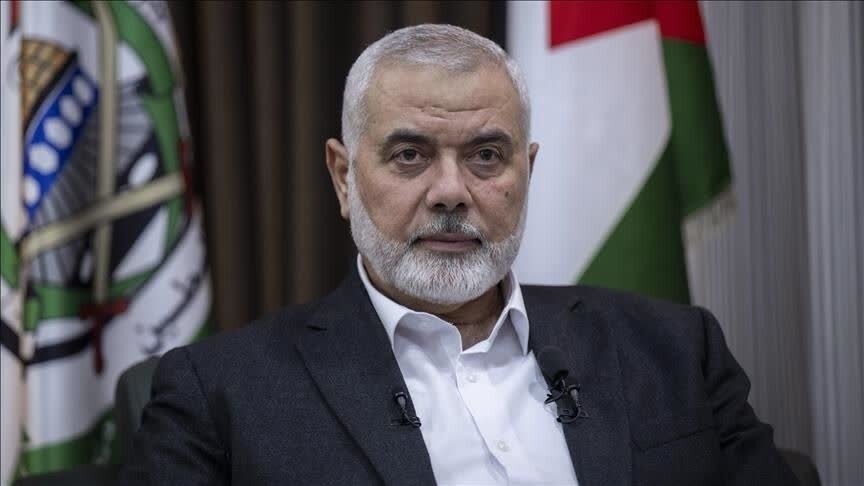
TEHRAN, (MNA) – Ismail Haniyeh, the political bureau chief of the Palestinian resistance movement Hamas sacrificed his life in line with the Palestinian cause from the occupied territories to Tehran where he was martyerd.
As a symbol of resistance, Haniyeh had long been in Israel’s crosshairs.
Finally, he was assassinated by Zionists, surprisingly not in Palestine where he fought for a priceless cause, but in Iran which was the last destination of his political life.
Hamas leader was born in the Shati refugee camp on the coast of Gaza City in 1962 to parents displaced from Asqalan (now known as Ashkelon) when Israel was formed in 1948.
Haniyeh pursued his secondary education at the al-Azhar Institute in Gaza.
As a young man, Haniyeh was a student activist at the Islamic University in Gaza City, where he studied Arabic literature. While at university in 1983, he joined the Islamic Student Bloc, an organization widely seen as the forerunner of Hamas.
He was detained by the Israeli military and served several sentences in Israeli jails in the 1980s.
Israeli regime imprisoned Haniyeh for 18 days at the age of 25, when he attended protests against the occupation. A year later, in 1988, he was jailed again for six months. The individual spent another three years in prison in 1989.

First Intifada
As a Palestinian uprising broke out in December 1987 against the Israeli occupation, known as the first Intifada, Haniyeh was among the youth taking part in protests. That was also the year Hamas was founded — with Haniyeh among its younger members.
Following his release, Israel deported Haniyeh to southern Lebanon along with hundreds of other Palestinian leaders and activists, where he spent a year. During that time, the group received unprecedented media coverage, establishing a global reputation.
After the signing of the Oslo Accords between Israel and the Palestinian Liberation Organization, Haniyeh returned to Gaza in 1993, at the age of 31, and was appointed dean of the Islamic University.
Haniyeh climbed the ranks within the movement as a close aide and assistant of Hamas’s cofounder, the late Sheikh Ahmed Yassin.
In 2001, as the second Intifada erupted, Haniyeh consolidated his position as one of Hamas’s political leaders, along with Yassin and Abdel Aziz al-Rantisi, who was among the co-founders of Hamas.
In 2003, Haniyeh and Yassin escaped an assassination attempt when Israeli jets bombed an apartment block in downtown Gaza where the two men were meeting. Only six months later, Yassin, who was a quadriplegic, was targeted and killed by Israeli helicopters as he left a mosque after the early morning prayer.
In 2006, at the age of 44, Haniyeh led Hamas to a legislative election victory over the Fatah movement, which had been in power for more than a decade.

He briefly served as prime minister of the Palestinian Authority (PA) in 2006.
Fatah and Hamas were soon locked in violent battles that led to the dismantling of their unity government in 2007.
Haniyeh was dismissed as prime minister by the president of the PA, Mahmoud Abbas. This set the stage for an independent Hamas-led government in the Gaza Strip – headed by Haniyeh. In response, Israel imposed a blockade on Gaza.
In reaction to the Israeli move, Haniyeh said that the seizure "should not break our will and should not turn this conflict into an internal Palestinian conflict".
"That conflict should be against the parties that impose the siege against the Palestinian nation."
Appointed as head of Hamas’s political bureau in 2017 and replacing Khaled Meshal, Haniyeh led Hamas’s diplomacy from several locations, including Turkey and the Qatari capital, Doha.
Within the Palestinian movement, Haniyeh had the reputation of a “pragmatist” who had open channels with different factions of the liberation struggle.
Haniyeh was a political figure and a pragmatic one,” Palestinian political analyst Nour Odeh told Al Jazeera.

“He was known for maintaining very positive relations with Palestinian leaders from all factions.”
“After 2003, Haniyeh gained a lot of popularity among Hamas people simply because of his stance, position, and media appearances,” Hassan Barrari, analyst and professor at Qatar University, told Al Jazeera.
“He remained a prominent figure until his assassination.”
Three of his sons were killed in an Israeli air strike that struck their vehicle. Four of his grandchildren were also killed – three girls and a boy.
“All our people and all the families of Gaza residents have paid a heavy price with the blood of their children, and I am one of them”
Through the blood of the martyrs and the pain of the injured, we create hope, we create the future, we create independence and freedom for our people and our nation,” he said, adding that about 60 members of his family, including nieces and nephews, have been killed since the start of the war.
“He will be known for demanding freedom and for his strength even as his family was being hunted down,” said Diana Buttu, a Palestinian lawyer and analyst who served as a legal adviser to the Palestinian team negotiating with Israel from 2000 to 2005.

Final chapter of Haniyeh's life wraps up in Tehran
Haniyeh and one of his bodyguards were martyred in their residence in the Iranian capital early on Wednesday.
They were killed after their residence was hit, the public relations office of the Islamic Revolution Guards Corps (IRGC) said in a statement.
Haniyeh was in Tehran to attend the inauguration ceremony of the new Iranian President Masoud Pezeshkian on Tuesday (July 30).
Reported by Tohid Mahmoudpour

No comments:
Post a Comment